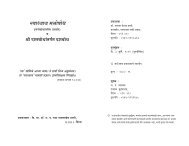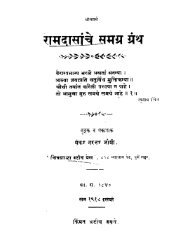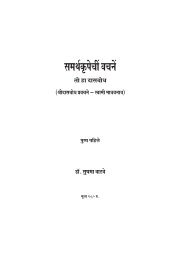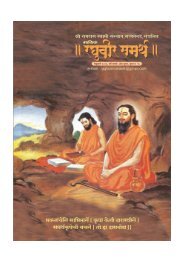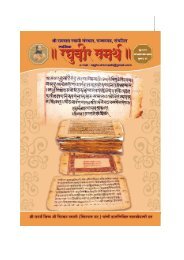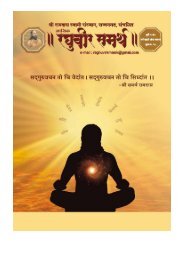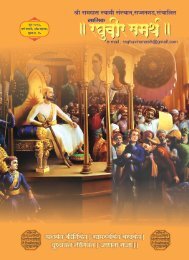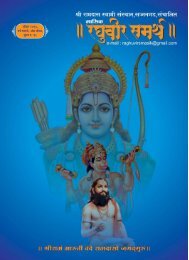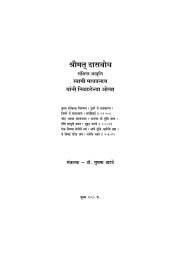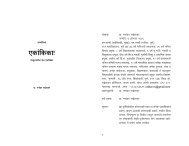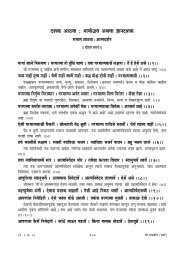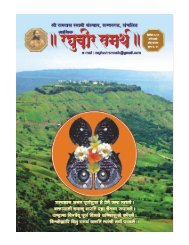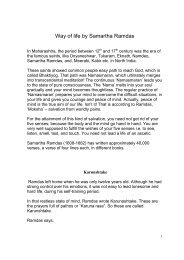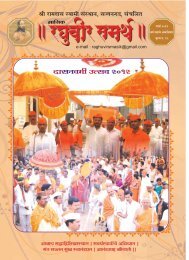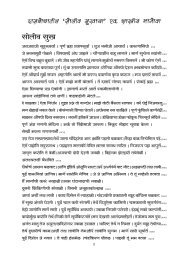THE DASBODHA BY: SADGURU SHREE SAMARTH RAMDAS ...
THE DASBODHA BY: SADGURU SHREE SAMARTH RAMDAS ...
THE DASBODHA BY: SADGURU SHREE SAMARTH RAMDAS ...
Create successful ePaper yourself
Turn your PDF publications into a flip-book with our unique Google optimized e-Paper software.
<strong>THE</strong> FOURTH DASHAK – NAVAVIDHA BHAKTI (NINE TYPES OF WORSHIP)<br />
<strong>THE</strong> FIRST SAMAS – SHRAVANBHAKTI (WORSHIP <strong>BY</strong> LISTENING)<br />
Shree Samarth praises and asks for the blessings of the Lord<br />
Ganesha, Goddess Sharada and finally the Guru who is even beyond the ultimate Atman and who is<br />
the Parbrahma himself. With their blessings he says that now he will be able to tell the nine types of<br />
worships which the God likes. These are told by the religious books. The first of these is the<br />
worship by listening to the, stories about the God, chanting of religious books and the lectures of<br />
the Saints and Sages on the various paths of spirituality like the paths of, Karma, gaining the real<br />
knowledge, worship, Yoga and Vairagya. One should also listen to the descriptions of, many<br />
amusing things in and about this world, big places of pilgrimage, many types of Sadhana, different<br />
types of people and their different ways of living, Yogis, people using mystical ways and<br />
witchcraft, many ways of chanting the Guru Mantra one of the ways of which is to keep one’s eyes<br />
open look in a horizontal line and try to see the Mantra which in fact is nowhere but with immense<br />
concentration one can not only see it but one goes into Samadhi (Lord Mahesh had done this),<br />
various types of Yogic exercises, anatomy, astronomy (Just imagine that Shree Samarth told this in<br />
the 17 th century!), geography, biology etc., abodes of Gods, the various sciences including the<br />
literary science, musical science etc., the virtues, medicines including herbal medicines and medical<br />
science, the happiness in the heaven and the grief in the hell, various philosophies, many paths<br />
leading to Moksha etc.<br />
Shree Samarth says that one should listen to all types of things but<br />
take only those which are beneficial and avoid those which are detrimental; this is known as the<br />
worship by listening. One should also listen to the biographies of the God who appeared on the<br />
earth in the bodily form and of his great disciples. By continuous thinking about the self one should<br />
find out the invisible form of the God. Both are very pure and of utmost important on the path of<br />
attaining Parbrahma.<br />
Shree Samarth says that at the time when the mind of the Yogi starts<br />
merging with the universal mind it acquires a micro quality yet becomes very broad which allows<br />
him to have control over the elements comprising of the earth. This enables him to have varied<br />
powers. These are: Going into the micro form whenever necessary, the art of becoming weightless,<br />
going into the boundless macro form, getting anything desired, the state of fulfillment of all the<br />
desires, getting control over all the living and nonliving, masterminding all the happenings in the<br />
universe, the ability to make anything successful and being anywhere at any given time etc.<br />
The gist of Shree Samarth’s preaching is that you should try to<br />
become inseparable from the God.<br />
END OF <strong>THE</strong> FIRST SAMAS<br />
<strong>THE</strong> SECOND SAMAS – KEERTANBHAKTI<br />
(WORSHIP <strong>BY</strong> RELIGIOUS DISCOURSE)<br />
Shree Samarth says that in religious discourse one should tell the<br />
biographies of different Gods in their bodily forms, to stress on this aspect one has to keep on<br />
talking continuously about God. For this, one needs to remember the contents and the messages of<br />
many religious books. He advises that without religious discourse one can’t please the God. To



